2006 CHEVROLET COLORADO height
[x] Cancel search: heightPage 7 of 434
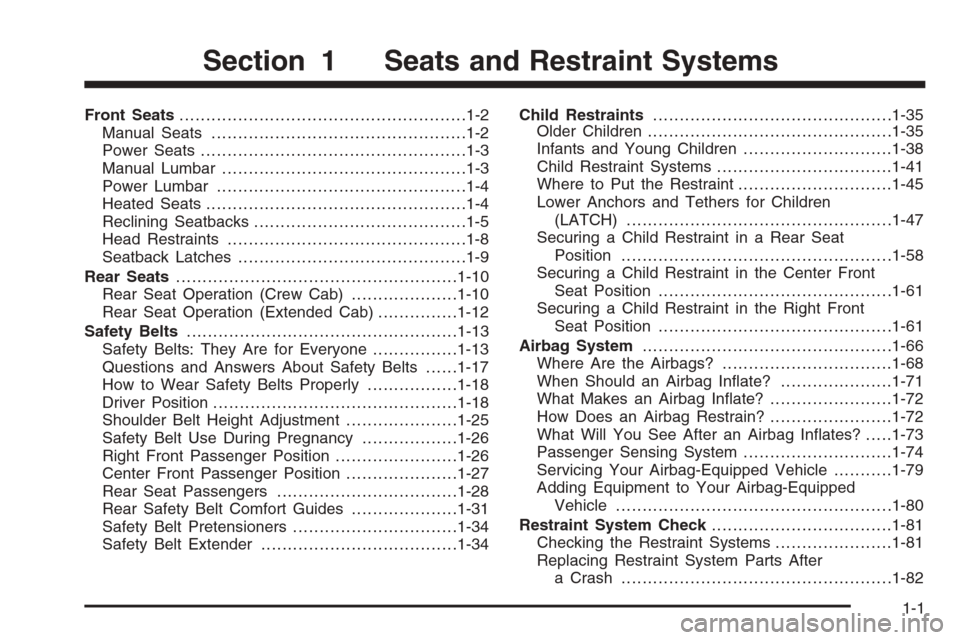
Front Seats......................................................1-2
Manual Seats................................................1-2
Power Seats..................................................1-3
Manual Lumbar..............................................1-3
Power Lumbar ...............................................1-4
Heated Seats.................................................1-4
Reclining Seatbacks........................................1-5
Head Restraints.............................................1-8
Seatback Latches...........................................1-9
Rear Seats.....................................................1-10
Rear Seat Operation (Crew Cab)....................1-10
Rear Seat Operation (Extended Cab)...............1-12
Safety Belts...................................................1-13
Safety Belts: They Are for Everyone................1-13
Questions and Answers About Safety Belts......1-17
How to Wear Safety Belts Properly.................1-18
Driver Position..............................................1-18
Shoulder Belt Height Adjustment.....................1-25
Safety Belt Use During Pregnancy..................1-26
Right Front Passenger Position.......................1-26
Center Front Passenger Position.....................1-27
Rear Seat Passengers..................................1-28
Rear Safety Belt Comfort Guides....................1-31
Safety Belt Pretensioners...............................1-34
Safety Belt Extender.....................................1-34Child Restraints.............................................1-35
Older Children..............................................1-35
Infants and Young Children............................1-38
Child Restraint Systems.................................1-41
Where to Put the Restraint.............................1-45
Lower Anchors and Tethers for Children
(LATCH)..................................................1-47
Securing a Child Restraint in a Rear Seat
Position...................................................1-58
Securing a Child Restraint in the Center Front
Seat Position............................................1-61
Securing a Child Restraint in the Right Front
Seat Position............................................1-61
Airbag System...............................................1-66
Where Are the Airbags?................................1-68
When Should an Airbag In�ate?.....................1-71
What Makes an Airbag In�ate?.......................1-72
How Does an Airbag Restrain?.......................1-72
What Will You See After an Airbag In�ates?.....1-73
Passenger Sensing System............................1-74
Servicing Your Airbag-Equipped Vehicle...........1-79
Adding Equipment to Your Airbag-Equipped
Vehicle....................................................1-80
Restraint System Check..................................1-81
Checking the Restraint Systems......................1-81
Replacing Restraint System Parts After
a Crash...................................................1-82
Section 1 Seats and Restraint Systems
1-1
Page 14 of 434
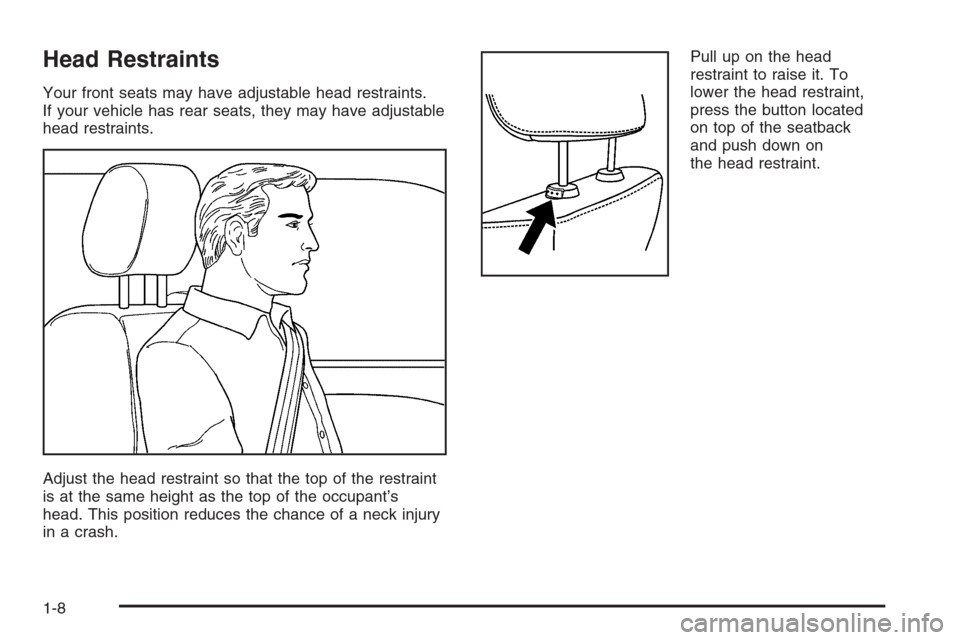
Head Restraints
Your front seats may have adjustable head restraints.
If your vehicle has rear seats, they may have adjustable
head restraints.
Adjust the head restraint so that the top of the restraint
is at the same height as the top of the occupant’s
head. This position reduces the chance of a neck injury
in a crash.Pull up on the head
restraint to raise it. To
lower the head restraint,
press the button located
on top of the seatback
and push down on
the head restraint.
1-8
Page 25 of 434

3. Pick up the latch plate and pull the belt across you.
Do not let it get twisted.
The shoulder belt may lock if you pull the belt
across you very quickly. If this happens, let the
belt go back slightly to unlock it. Then pull the belt
across you more slowly.4. Push the latch plate into the buckle until it clicks.
Pull up on the latch plate to make sure it is secure.
If the belt is not long enough, seeSafety Belt
Extender on page 1-34.
Make sure the release button on the buckle is
positioned so you would be able to unbuckle the
safety belt quickly if you ever had to.
5. Move the shoulder belt height adjuster to the height
that is right for you. Improper shoulder belt height
adjustment could reduce the effectiveness of
the safety belt in a crash. SeeShoulder Belt Height
Adjustment on page 1-25.
1-19
Page 31 of 434
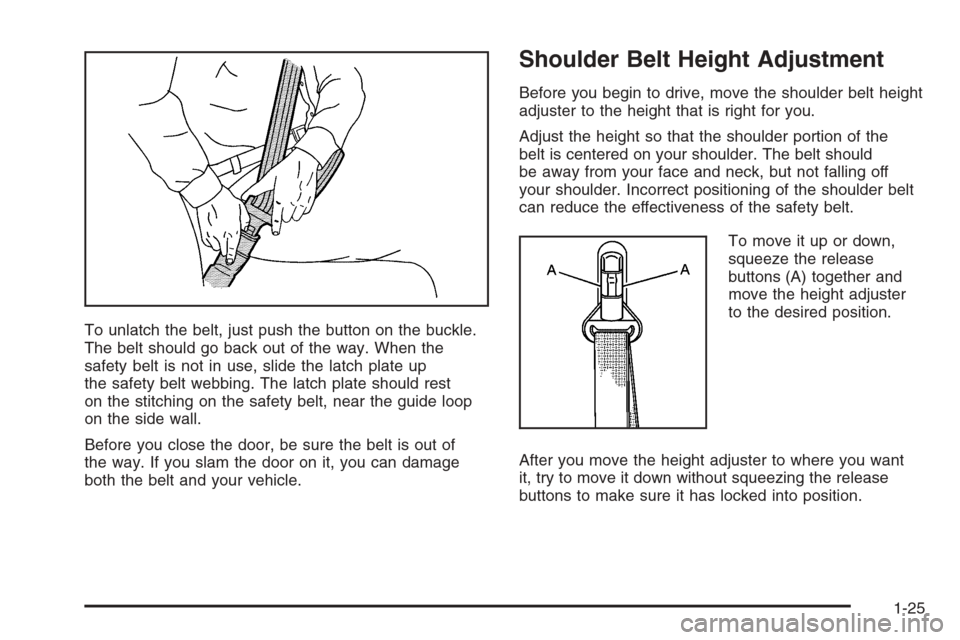
To unlatch the belt, just push the button on the buckle.
The belt should go back out of the way. When the
safety belt is not in use, slide the latch plate up
the safety belt webbing. The latch plate should rest
on the stitching on the safety belt, near the guide loop
on the side wall.
Before you close the door, be sure the belt is out of
the way. If you slam the door on it, you can damage
both the belt and your vehicle.
Shoulder Belt Height Adjustment
Before you begin to drive, move the shoulder belt height
adjuster to the height that is right for you.
Adjust the height so that the shoulder portion of the
belt is centered on your shoulder. The belt should
be away from your face and neck, but not falling off
your shoulder. Incorrect positioning of the shoulder belt
can reduce the effectiveness of the safety belt.
To move it up or down,
squeeze the release
buttons (A) together and
move the height adjuster
to the desired position.
After you move the height adjuster to where you want
it, try to move it down without squeezing the release
buttons to make sure it has locked into position.
1-25
Page 45 of 434
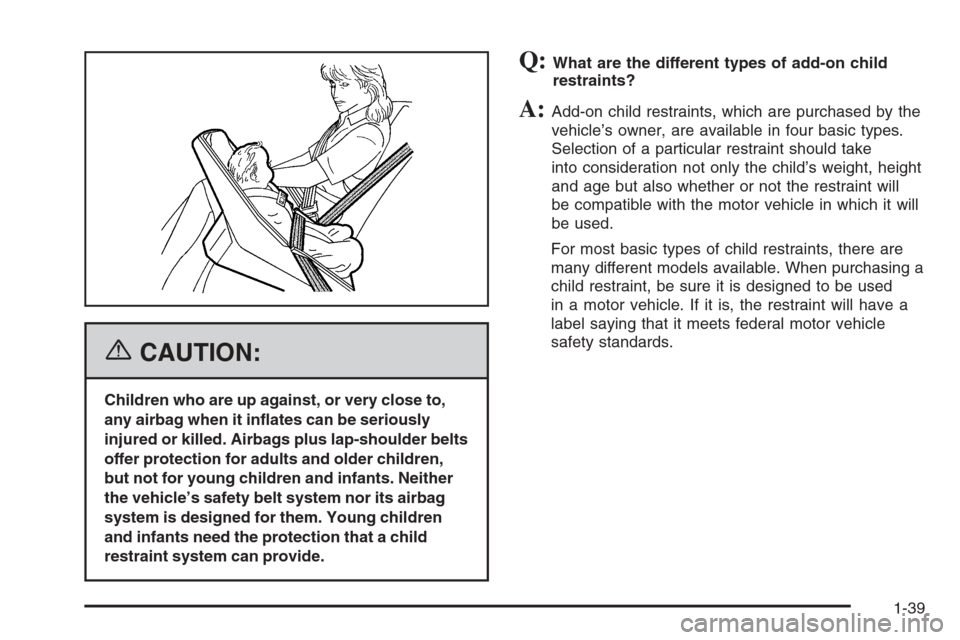
{CAUTION:
Children who are up against, or very close to,
any airbag when it in�ates can be seriously
injured or killed. Airbags plus lap-shoulder belts
offer protection for adults and older children,
but not for young children and infants. Neither
the vehicle’s safety belt system nor its airbag
system is designed for them. Young children
and infants need the protection that a child
restraint system can provide.
Q:What are the different types of add-on child
restraints?
A:Add-on child restraints, which are purchased by the
vehicle’s owner, are available in four basic types.
Selection of a particular restraint should take
into consideration not only the child’s weight, height
and age but also whether or not the restraint will
be compatible with the motor vehicle in which it will
be used.
For most basic types of child restraints, there are
many different models available. When purchasing a
child restraint, be sure it is designed to be used
in a motor vehicle. If it is, the restraint will have a
label saying that it meets federal motor vehicle
safety standards.
1-39
Page 46 of 434
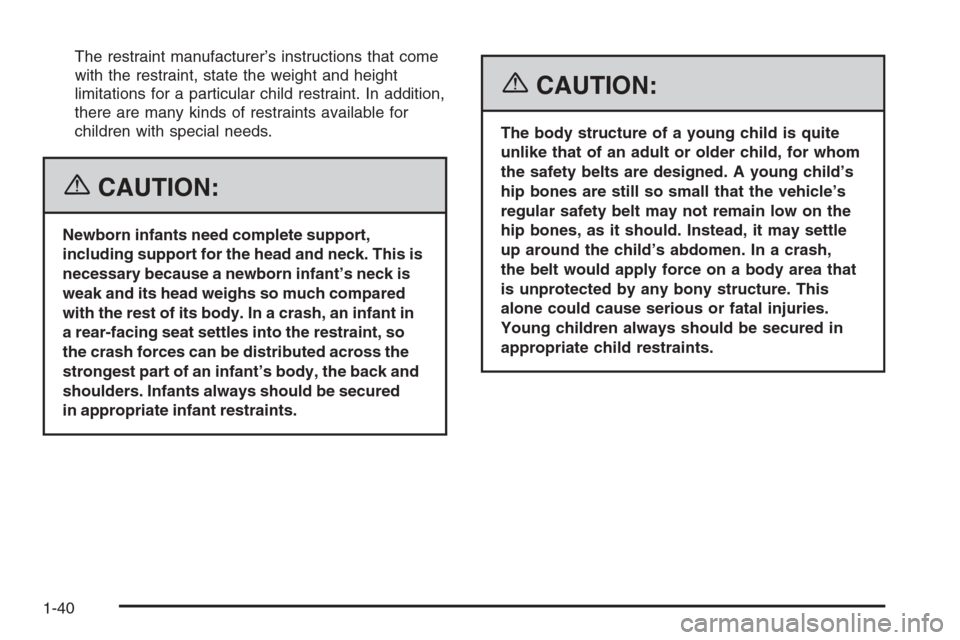
The restraint manufacturer’s instructions that come
with the restraint, state the weight and height
limitations for a particular child restraint. In addition,
there are many kinds of restraints available for
children with special needs.
{CAUTION:
Newborn infants need complete support,
including support for the head and neck. This is
necessary because a newborn infant’s neck is
weak and its head weighs so much compared
with the rest of its body. In a crash, an infant in
a rear-facing seat settles into the restraint, so
the crash forces can be distributed across the
strongest part of an infant’s body, the back and
shoulders. Infants always should be secured
in appropriate infant restraints.
{CAUTION:
The body structure of a young child is quite
unlike that of an adult or older child, for whom
the safety belts are designed. A young child’s
hip bones are still so small that the vehicle’s
regular safety belt may not remain low on the
hip bones, as it should. Instead, it may settle
up around the child’s abdomen. In a crash,
the belt would apply force on a body area that
is unprotected by any bony structure. This
alone could cause serious or fatal injuries.
Young children always should be secured in
appropriate child restraints.
1-40
Page 86 of 434

Adding Equipment to Your
Airbag-Equipped Vehicle
Q:Is there anything I might add to the front or
sides of the vehicle that could keep the
airbags from working properly?
A:Yes. If you add things that change your vehicle’s
frame, bumper system, height, front end or side
sheet metal, they may keep the airbag system from
working properly. Also, the airbag system may
not work properly if you relocate any of the airbag
sensors. If you have any questions about this,
you should contact Customer Assistance before you
modify your vehicle. The phone numbers and
addresses for Customer Assistance are in Step Two
of the Customer Satisfaction Procedure in this
manual. SeeCustomer Satisfaction Procedure
on page 7-2.
Q:Because I have a disability, I have to get my
vehicle modi�ed. How can I �nd out whether
this will affect my airbag system?
A:Changing or moving any parts of the front seats,
safety belts, the airbag sensing and diagnostic
module, steering wheel, instrument panel,
ceiling headliner, ceiling and pillar garnish trim,
roof-mounted airbag modules, or airbag wiring
can affect the operation of the airbag system.
If you have questions, call Customer Assistance.
The phone numbers and addresses for Customer
Assistance are in Step Two of the Customer
Satisfaction Procedure in this manual. See
Customer Satisfaction Procedure on page 7-2.
1-80
Page 320 of 434
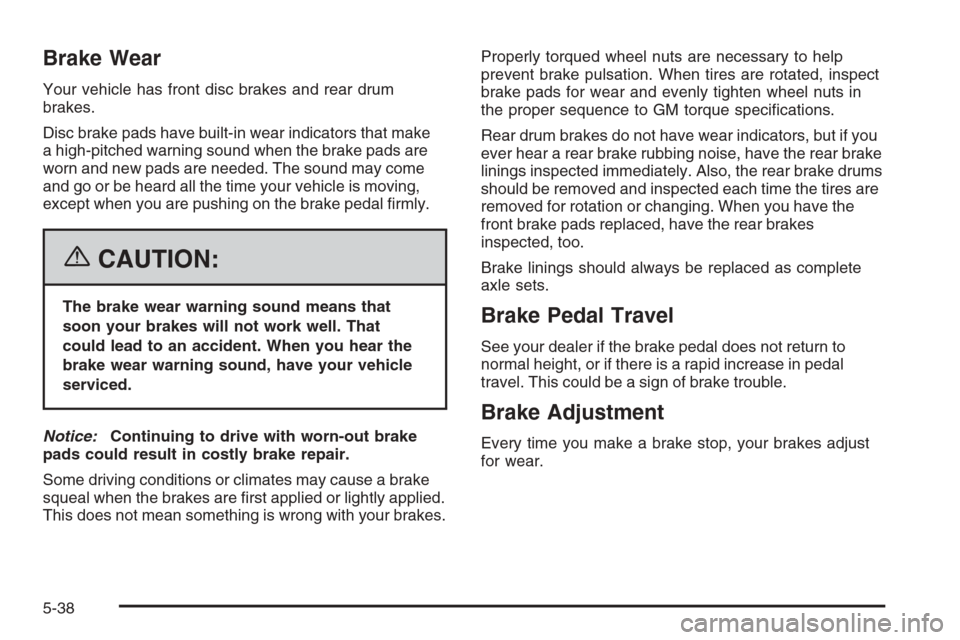
Brake Wear
Your vehicle has front disc brakes and rear drum
brakes.
Disc brake pads have built-in wear indicators that make
a high-pitched warning sound when the brake pads are
worn and new pads are needed. The sound may come
and go or be heard all the time your vehicle is moving,
except when you are pushing on the brake pedal �rmly.
{CAUTION:
The brake wear warning sound means that
soon your brakes will not work well. That
could lead to an accident. When you hear the
brake wear warning sound, have your vehicle
serviced.
Notice:Continuing to drive with worn-out brake
pads could result in costly brake repair.
Some driving conditions or climates may cause a brake
squeal when the brakes are �rst applied or lightly applied.
This does not mean something is wrong with your brakes.Properly torqued wheel nuts are necessary to help
prevent brake pulsation. When tires are rotated, inspect
brake pads for wear and evenly tighten wheel nuts in
the proper sequence to GM torque speci�cations.
Rear drum brakes do not have wear indicators, but if you
ever hear a rear brake rubbing noise, have the rear brake
linings inspected immediately. Also, the rear brake drums
should be removed and inspected each time the tires are
removed for rotation or changing. When you have the
front brake pads replaced, have the rear brakes
inspected, too.
Brake linings should always be replaced as complete
axle sets.Brake Pedal Travel
See your dealer if the brake pedal does not return to
normal height, or if there is a rapid increase in pedal
travel. This could be a sign of brake trouble.
Brake Adjustment
Every time you make a brake stop, your brakes adjust
for wear.
5-38